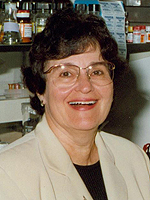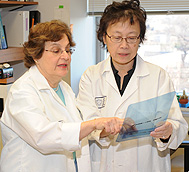

FULL STORY
Dr. Susan Horwitz' Discovery of How Taxol Works Is Focus of Cover Story & Award Nomination
The recently published 2007 annual report of the National Foundation for Cancer Research, "Research for a Cure," features Dr. Susan Band Horwitz, Distinguished Professor and Co-Chair of the Department of Molecular Pharmacology, as its cover story. In addition, Dr. Horwitz has been nominated to receive the 2008 Medal of Honor Award in Clinical Research, the highest award bestowed by the American Cancer Society.
As the cover story notes, 30 years ago, Dr. Horwitz requested and received a sample of the molecule Taxol, a byproduct of the Pacific yew tree that had been demonstrated to possess an unusual propensity for killing cancer cells. While Taxol's appetite for devouring some tenacious cancer cells was known, no one had yet determined how the molecule worked. Within months of receiving the samples she had requested, Dr. Horwitz and her colleagues determined that the drug interacted with and stabilized microtubules, a new mechanism of action for an antitumor agent.
 Her pioneering work with Taxol uncovered the molecular mechanisms by which it killed cancer cells, while her current research seeks to identify and understand epigenetic mechanisms relevant to current drug resistance that renders Taxol and other cancer therapies less effective.
Her pioneering work with Taxol uncovered the molecular mechanisms by which it killed cancer cells, while her current research seeks to identify and understand epigenetic mechanisms relevant to current drug resistance that renders Taxol and other cancer therapies less effective.
Following Dr. Horwitz' discovery, Taxol became the prototype for a whole new class of chemotherapeutic drugs and gave oncologists a new weapon in the fight against cancer. Today, in spite of the drug resistance that sometimes inhibits its effectiveness, Taxol is one of the most widely used chemotherapy drugs in the world, prescribed to treat cancers of the ovary, breast and lung.
 Drug resistance to Taxol has led Dr. Horwitz to study the molecular mechanisms that underlie a tumor cell's ability to resist the drug's anti-cancer fighting agents. In doing so, she is seeking to identify the genes within a network of genes that could be responsible for the drug resistance. Because these epigenetic changes can be reversed, Dr. Horwitz is looking to pinpoint them, thereby providing another powerful target for combating cancer.
Drug resistance to Taxol has led Dr. Horwitz to study the molecular mechanisms that underlie a tumor cell's ability to resist the drug's anti-cancer fighting agents. In doing so, she is seeking to identify the genes within a network of genes that could be responsible for the drug resistance. Because these epigenetic changes can be reversed, Dr. Horwitz is looking to pinpoint them, thereby providing another powerful target for combating cancer.
Dr. Horwitz, who is a past-President of the American Association for Cancer Research, has been widely recognized for her world leadership in natural products cancer research. Her many accolades include receiving the Warren Alpert Foundation Prize from Harvard Medical School, the Bristol-Myers Squibb Freedom to Discover Award for Distinguished Achievement in Cancer Research, and the Mayor's Award for Excellence in Science & Technology, as well as election to the National Academy of Sciences, the Institute of Medicine, and the American Academy of Arts and Sciences. She also is the Falkenstein Professor of Cancer Research at Einstein.
To read the NFCR's complete story on Dr. Horwitz and her exciting, ground-breaking research, please see the NFCR Annual Report.
Posted on: Thursday, May 22, 2008


